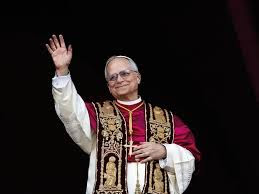On this day in 313 A.D., Constantine the Great signed the Edict of Milan granting religious freedom throughout the Roman Empire. The Catholic or Christian Church had been growing since the first Pentecost on May 25, 33 A.D. The new church took advantage of safe Roman roads to spread the Word.
Before Constantine's edict, Christians were subject to persecution. The problem with Christians was that they only worshiped one god. The loyal Roman citizen worshipped several gods to make sure of victory in war. Whenever things went wrong, the pagans blamed the Christians for making the gods angry. It was a life or death matter. Several thousand Christians were martyred before Constantine came to believe that Jesus helped him defeat his rivals.
With the fear of persecution out of the way, the Christians could settle scores among themselves. Right from the beginning, Christians had been trying to determine what Jesus' relation to God the Father was. In 325, the bishops held a council saying Jesus and God were equal and any other belief was heresy. Several years later the role of the Holy Spirit was clarified and the Trinity was in place. In the following centuries, you could lose your job or your head for getting the Trinity wrong.
Things really took off in 380 A.D. when Christianity became the official religion of the Roman Empire. The books of the Bible as we have them now were set at this time. Because Peter had died in Rome, the bishop of Rome claimed supremacy over the entire church. Not everyone agreed with him, but Rome's perseverance resulted in the unity of the modern Catholic Church.
In the fifth century the Roman Empire was transforming into the Medieval period. When the pope was threatened by the German barbarians, he received help from the French barbarians. By the seventh century, the Muslims were taking over North Africa and were threatening Europe. A couple of key victories kept Europe Christian, otherwise we might all be acknowledging Allah now.
After the French king gave the pope a large area in central Italy, the pope could afford to have his own army. Meanwhile the monks and friars were opening universities as outgrowths of their monasteries. The Middle Ages was the high point for the Church. In 1054 the Church split into eastern and western churches. The East didn't like the bishop of Rome saying he was supreme over everyone. When the Muslims took Constantinople in 1453, the east-west power struggle in church matters became a dead issue.
The church sponsored several Crusades to retake Jerusalem. They accomplished that, but held Jerusalem for less than a century while killing lots of innocent people along the way. The Inquisition of about the same time also killed people for having heretical views. The fear of being burned alive kept most heretics quiet. For forty years in the fourteenth and early fifteenth centuries there were two popes. Critics of papal corruption had to be tactful to avoid martyrdom.
The Renaissance was another good time for the Church. The Church sponsored the great artists of the time, rebuilt Rome and fought wars to acquire more land. It also grew more corrupt. It was the selling of indulgences to build the new St Peter's Church that annoyed Martin Luther. Luther's complaints were taken up by German rulers who wanted to cut down the pope's power. This led to the Reformation and more death and destruction.
The Church survived the Reformation. It is still struggling today to survive the 17th century Enlightenment. The Enlightenment elevated human reason above divine revelation. The Church started to lose its grip, especially in France where the revolutionary government worshiped Reason itself. It's been easier for the Church to be politically neutral since it lost its lands in the 19th century. The Vatican became a sovereign state of 109 acres surrounded by Rome.
The Church has had to confront a changing modern world and deal with internal crises, financial and sexual. It's still here after two thousand years; still trying to remain relevant while staying true to its mission of revealing God to humanity.
 |
| Leo XIV Pope number 267 Best wishes |
Yup. And though we ain’t there - there’s the ongoing reality of the now and the not yetness of God’s unfolding.
ReplyDeleteAs it was in the beginning, is now and ever. Let it be so.
May the blessings be.
ReplyDelete